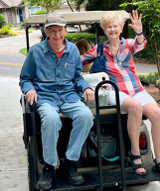Collective Humanity
Supporting Families and Medical Professionals through Loss in the COVID-19 Pandemic
I watched my father draw his last breath via the Ring app on my phone. When I first learned of his stroke, I rushed to sweet home Alabama to be by his side and do everything in my power to help him recover from this particular setback. Little did I know that this was the first domino to fall in a long line of diagnoses that would later result in a trip back home with my entire family to send my father off in a new style dictated by the COVID-19 pandemic. My father had his stroke in January and bid us farewell by mid-March of this year. Needless to say, his passing has been heart-wrenching and accompanied by all the stages of grief that have been articulated many times before. I know that my circumstance is not unique. As COVID-19 cases and deaths soar, so does the number of families interacting with medical professionals and institutions. Similarly, those entities work with more families than ever as they confront the hospitalization and potential passing of their loved ones. Death is not unique; it comes to us all, but how families and health practitioners are navigating; it is entirely new. Never in a million years did I think that I would witness my father's death electronically, engage with his healthcare workers via video conferencing, record important procedures related to his care on my phone, or live stream his service on Facebook. But, it is 2020, and this is the reality that we find ourselves accepting.
The months between the stroke and the passing were punctuated by numerous conversations, interviews, and training with medical professionals from different agencies. Some were professional, and others were common in a familial way that was comforting but didn't inspire confidence in their expertise. The latter were the ones that instinctively knew when it was appropriate to hold your hand or tell the truth about the situation in a way that you could hear at the time. It was rare that my family experienced a mix of competence and compassion in the same person. When we did, it moved us all to tears knowing that we were in capable hands. In the middle of that storm, I took note of the various workers' strengths and weaknesses and made a mental note to contact their agencies when it was all over. That might seem strange to some, but I am wired that way. Blessing or curse, I am always looking for ways to fix things. Nothing is ever perfect, but such is life.
After almost a year, I have some distance from the loss, and nagging questions that won't go away are: How are medical professionals trained to support families during these unusual times? How are they being trained to have difficult conversations with families about the impending death of their beloved? How are they being cared for by their organizations as they navigate a maze of unending loss almost daily? Our family’s experience included a range of professionals, including hospital physicians, nurses, in-home support care, private healthcare providers, and hospice care workers. My father's journey extended from the hospital to the rehab center, back to the hospital, and finally back home. Although the settings were different, we were interacting with people who had varying degrees of bedside manner and who were also experiencing different degrees of burnout and fatigue. I remember one worker telling me that our in-home appointment was one of about twelve scheduled for the day. She shared that she rarely had time to eat lunch because of the jam-packed schedule. When she left a list of resources for us, she admitted that she wasn't sure if the vendors would be responsive because her company had transitioned to new partnerships, but the materials had not been updated. This resulted in many frustrating calls to customer support lines and being re-routed to other departments who were deemed better equipped to respond to our support request for that day. These annoyances were slight compared to the interaction with the hospice nurse, who on my father's last day on this side of heaven, forgot to turn his volume down, allowing me to hear (via Ring) his co-worker on the other end of the line ask, "Has he expired yet?” To which he responded, “not yet.” His response then prompted the question, “Well, how much longer?” By this point, the worker realized that we could hear everything and scrambled to turn down the volume. But, alas, it was too late. When he replied, “I would say a few hours or so,” we had enough context to know that we should cue our loved ones to say their final goodbyes. In that brief exchange, they conveyed that in their minds our father was mere material with an expiration date. Casting him as some widget in a system instead of a treasured human being.
I am sharing the details of our experience to highlight the need for improved training and mental health support for medical professionals. I understand that some level of psychological distance is necessary for them to survive their work's impact. However, it is equally important that they understand the idea of bereavement outcomes and how their actions can impact families. A group of researchers led by Sue Morris, et al, of Harvard Medical School, Boston, Massachusetts estimate that 10-20% of individuals who have lost a loved one will experience psychiatric disturbances, including grief disorder, post-traumatic stress disorder, and depression. Unfortunately, there is no standardized method for assessing bereavement outcomes. Compounding this problem is the evidence that there is a higher risk for poor bereavement outcomes for communities of color, to which my family belongs. One model currently available for use is comprised of a three-tiered approach to risk and support. The authors identified low risk, moderate risk, and high-risk groups. They differentiated the type of support needed for each one. These include support from friends and family for low-risk, community support for mid-risk, and mental health intervention for high-risk groups.
Medical professionals express that they feel ill-equipped to engage in bereavement outreach. Researchers suggest using template bereavement resources for medical professionals to share with families before their loved one transitions. Another best practice some hospitals are implementing is routine condolence calls following the transition using the TEARS model that includes the following components: timing, express condolences, ask, recommend, and say goodbye. This model positively impacts families because it lets them know that the hospital viewed their loved one as a person, not a number. I can attest that our family would have felt a measure of peace, knowing that someone from the web of providers recognized that our father was a real person with people who loved him.
Additionally, medical professionals experience their own psycho-emotional distress in light of the frequency of daily deaths. Dr. Amrapali Maitra of Brigham and Women’s Hospital at the Harvard Medical School describes the emotional challenges of dealing with mounting patient loss during COVID in her opinion piece featured in the December, 2020 issue of the JAMA Internal Medicine journal. While her article focused on physicians' well-being, it was written in such an intimately personal way that revealed the collective humanity of the people who make up the machine of healthcare. I understood the importance of mental health care for the workers through my own journey. Still, her article reinforced the idea that medical organizations should provide their workers with avenues and space to process their grief.
Eventually, the COVID-19 pandemic will pass and we will return to some semblance of normalcy. We will not be forced to cope with the current level of uncertainty and turmoil. What will endure is the need for qualified, well-trained medical professionals who are well-adjusted and prepared to meet new challenges that arise. It is my hope that we take the lessons learned during these tumultuous times and apply them to create and sustain best practices that recognize acknowledge the humanity of us all.
About the Author
A.N. Walters currently works in the nonprofit education sector. She is passionate about knowledge sharing because she wholeheartedly believes that collective brainstorming and resource development can solve almost any problem.




